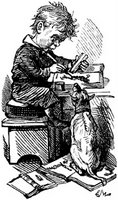
Lasik Danbury
You’ll recall that, at the last board meeting, Trustee Wagner led the board in ending the colleges’ memberships in the American Library Association (ALA), the foremost organization of librarians in the U.S.
According to Wagner, the ALA is a bunch of “liberal busybodies.”
Listen to his motion:
Listen to the subsequent discussion: Milchiker, Lang, Wagner, Fuentes:
Wagner emphasized the ALA’s opposition to the Children’s Internet Protection Act (CIPA), which requires of public libraries that “filters” be installed on (public use) library computers—in order to protect children from internet porn. (I do think Mr. Wagner's remarks imply that he favors CIPA. I could be mistaken.)
Unsurprisingly, the ALA has long been a foe of censorship—we all remember reading about book burnings and lists of condemned books. The ALA has always been on Team Freedom re that battle. And so, with perfect consistency, ALA has from the beginning viewed CIPA as onerous.
I went to the ALA website and could not find the "ALA" remarks that Mr. Wagner quotes. But I did find the following address given by John W. Berry back in 1999. At the time, Berry was ALA’s President-elect.
Here, Berry presents what seems to be the essence of ALA’s position on CIPA and internet filters (if my perusal of the ALA website is any guide).
 John W. Berry
John W. BerryPresident-elect, American Library Association, 2000–2001
On ALA vs. United States
Challenge to the Children’s Internet Protection Act

ood morning. I am John W. Berry, President-elect of the American Library Association and I’ll moderate this morning’s press conference.…
On Christmas day, 1820, a 77-year old Thomas Jefferson wrote these words from Monticello to his friend Thomas Ritchie: “But I am far from presuming to direct the reading of my fellow citizens, who are good enough judges themselves of what is worthy of their reading.”
It is appropriate that we assemble here in Philadelphia, the Founders city, to reaffirm our support for the constitutional rights of all Americans to “be good enough judges themselves of what is worthy of their reading” or of their religious practice, or of their speaking.
This morning, the American Library Association with the Freedom to Read Foundation and nine other plaintiffs, filed a complaint in the United States District Court for the Eastern District of Pennsylvania challenging the Children’s Internet Protection Act (CIPA) signed into law on December 21st of last year.
Former President Clinton, upon signing the funding bill that included CIPA as a “rider,” expressed his disappointment with the legislation: “I believe that local development of an Internet-acceptable use plan is a more effective solution than mandatory filtering for ensuring comprehensive protection while meeting the diverse needs of local schools and libraries.”
Let us be clear about several things:
• This act imposes unprecedented, sweeping Federal speech restrictions on public libraries across the nation.
• Filters are contrary to the mission of the public library, which is to provide access to the broadest range of information for a community of diverse individuals. Filters block access to critical, constitutionally protected speech related to many subject areas. Filters have been shown to block access to medical information, political information and information related to the arts and literature.
• Librarians care deeply about children. Libraries already have policies and programs to ensure children have an enriching and safe online experience. More than 95 percent of public libraries have Internet-use policies that were created with community input and local control, and they offer classes on how to use the Internet to get good information.
In our libraries, we find kids use the Internet the same way they use other library services. They work on homework assignments, read about sports, music and other interests, and communicate with their friends. The vast majority of children and adults continue to use the library responsibly and appropriately.

The American Library Association believes strongly that the Children’s Internet Protection Act is unconstitutional. The filtering mandate imposed by Congress is unworkable in the context of a public institution because it restricts access to constitutionally protected speech on the users served by libraries. No filtering or blocking technology exists that blocks access only to speech that is obscene, child pornography or harmful to minors. And no filtering technology protects children from all objectionable materials. Many of you will have seen the March issue of Consumer Reports evaluating several filtering software products; the best of the products failed to block one objectionable site in five.
We’re concerned that filters give parents a false sense of security that their children are protected when they are not. Not all problems brought on by transformative technological innovation, like the Internet, have technological solutions, at least in the short term. We believe that education is more effective than filters—kids need to make good decisions about what they read and view, no matter where they are. To be sure, this is a collaborative effort between parents, teachers, librarians and many others.
The Children’s Internet Protection Act is a misnomer. The legislation does not strictly limit access for minors, but for adults and all Internet users in a library.

And finally, the act allows for unblocking specific Web sites if a user can demonstrate a “bona fide research or other lawful purpose”—both of which are left undefined. We do not believe that library staff should be put in the position of deciding what is “legitimate” or “objectionable” on a case-by-case basis.
CIPA is, in short, unworkable and fundamentally misguided.
[Link: Berry's address]

n his remarks about ALA last month, Mr. Wagner implied that the ALA does not care about children’s access to pornography on the internet--that the organization even favors children's access to anything and everything there. Clearly, that is not true. The ALA does view children’s access to porn as a problem, but it rejects CIPA’s means of protecting children as both ineffectual and offensive to a community that values freedom.
 As you know, conservatives on our board have long been champions of “local control” re community colleges. When, several years ago, the authors of the Citizens’ Commission on Higher Education cited our district to illustrate how “local control” of California community colleges goes wrong (see note 1 below), the usual suspects on the board squawked the usual Reaganesque squawk about the importance of local oversight. Such squawkage can still be heard at SOCCCD board meetings.
As you know, conservatives on our board have long been champions of “local control” re community colleges. When, several years ago, the authors of the Citizens’ Commission on Higher Education cited our district to illustrate how “local control” of California community colleges goes wrong (see note 1 below), the usual suspects on the board squawked the usual Reaganesque squawk about the importance of local oversight. Such squawkage can still be heard at SOCCCD board meetings.But when it comes to libraries, which are staffed by persons who warm to ALA’s “liberal” take on speech and info (namely, that speech should be free, that censorship is bad), suddenly, our conservative board members are against local control. Suddenly, they want the feds to restrict and to control the locals.
Perhaps they do not support CIPA. Perhaps they are for local control here, too. Mr. Wagner did start his discussion by referring to the liberal or leftist partisanship of the ALA.
Still, one issue here concerns the ALA’s stance regarding CIPA and children. Is it what Mr. Wagner says it is? I can find no evidence to support that view.
I recommend visiting the following site: ALA on CIPA. (Click)
Mr. Wagner seemed also to be offended by the ALA’s (i.e., these “busybodies”’) objections to the Patriot Act. To learn about ALA’s stance on that legislation, go to ALA on Patriot Act.
Notes:
1. THE CITIZENS COMMISSION.
From a December '99 issue of Dissent:
In early April (‘99), the California Citizens Commission on Higher Education issued a report recommending the elimination of locally elected community college boards. According to the Register, "Too often, the commission argues, college boards micromanage their campuses, undermining trained administrators and creating disharmony. Commissioners cited the three years of turmoil at South Orange County Community College District as an example of what could go wrong with locally elected trustees...." (4/6/99)
2. WAGNER V. THE FEDS.
In an article entitled “Defining Control” (Register, 6/16/98), Don Wagner offers his view on “local control” of schools and the dangers of “the federal government…overreaching its powers.”
3. ALA AS ACCREDITING AGENCY.


4. CENSORED BOOKS
Link to interesting site re banning, censoring books:
Bonfire of the Liberties
(click on "censored books")




3 comments:
Chunk, I know you're trying to make sense of Wagner's position by recognizing the politics fueling him, but the fact is, this guy doesn't read books. Like other board members, he hates anything that smacks of intellect (books, see, contain words). This is the Great Irony of the SOCCCD governing board. People endeavor to become elected members of a college board when--why-oh-why?--they hold education and educators in disdain.
Oh Leafy One:
I agree. I've often labelled this board with "anti-intellectualism."
On the other hand, I do think that Herr Wagner reads books. Just not the books you and I read. He reads Regnery books. Like that new David Horowitz tome--the one that forgot to include me or the Reb on his list. Bastard.
Am I trying to make sense of Wagner's politics?
I'm suggesting that Wagner and his pals might be a tad hypocritical.
That might not be helpful, but it's at least fun. Or no?
Jonathan:
That's a fine idea. But let's wait. It is possible that the board will reverse itself as it did in the case of nixing the "Spain" trip.
Post a Comment